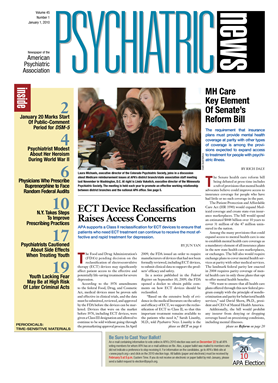APA is strongly objecting to a proposal by the Obama administration to no longer recognize consultation codes for Medicare reimbursement.
As part of the 2010 Medicare physician payment update, the federal Centers for Medicare and Medicaid Services (CMS) has announced that it will no longer pay for the outpatient and inpatient consultation codes (99241-99245 and 99251-99255). Instead, the administration is advising physicians to use the new patient, initial hospital care, or initial nursing facility care evaluation and management (E&M) codes for the designated setting; those codes would be paid at a higher rate.
The payment update also mandates a 21.2 percent across-the-board cut in physician Medicare reimbursement (Psychiatric News, December 4, 2009).
Additionally, it is unclear whether private payers will follow suit regarding payment for consultation codes.
The payment decrease for this year and the ruling regarding the consult code were announced in a final rule that appeared in the Federal Register on November 25, 2009. Without congressional intervention, the new Medicare payments and policies outlined in the final rule were to go into effect on January 1.
(At press time the Medicare Physician Payment Reform Act, passed by the House of Representatives in November 2009, was under consideration by the Senate. It would replace the proposed payment cut with a small positive adjustment. Additionally, APA is supporting an amendment to the Patient Protection and Affordable Care Act, HR 3590, introduced by Sen. Arlen Specter [D-Pa.], that would delay implementation of the ruling by one year.)
In the meantime, APA filed comments with CMS objecting to the proposal regarding consultation codes, saying it could financially discourage care coordination and communication between consulting and admitting physicians. APA also says the ruling would undermine the established process by which the CPT (Current Procedural Terminology) codes are valued by the AMA's Relative Value Scale Update Committee (RUC).
“Consultations are a legitimate and important part of medical practice, particularly in the psychiatric setting,” APA stated in comments to CMS. “Physicians often request psychiatric consultations for their most medically complex patients. There is a large amount of work inherently involved in such consultations and the subsequent report back to the requesting physician.”
APA's comments also note that a consultation is typically more complicated and labor intensive than “evaluation and management,” the code that is being proposed as a replacement by CMS.
The administration has cited, as a reason for the ruling on consultation codes, a 2006 report by the Office of the Inspector General that found that Medicare paid approximately $1.1 billion more than it should have for consultation services in 2001. That report stated that the majority of the errors were “billed as the wrong type or level of consultation” and that the bulk of the rest of the improperly billed codes were errors created by lack of documentation and/or services that did not meet the definition of a consultation.
CMS claimed in its ruling that educational outreach efforts, recommended by the inspector general's report and intended to rectify the coding problems, have not been successful.
But APA, in its comments to the agency, has questioned that conclusion, noting that CMS offered no evidence that the problems were ongoing. Also, APA recommended that the agency reevaluate whether the miscoding of consultations is still as prevalent as it had been prior to the inspector general's report.
“We believe that the proposed solution does not accurately address the current problem, undervalues physician time and expertise, may adversely impact patient care by disincentivizing care coordination,” and undermines the established process by which codes are valued. “We urge CMS to abandon this proposal and seek other ways to reduce coding errors for consultations.”
